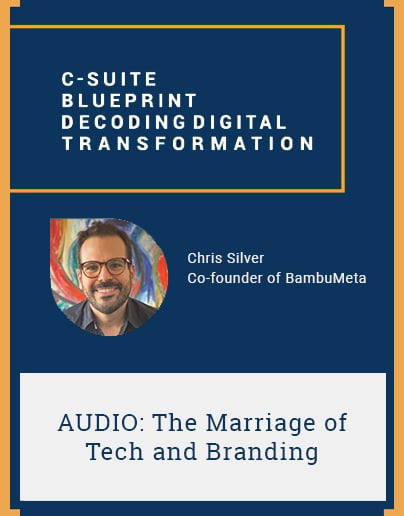C-Suite BluePrint: Decoding Digital Transformation
Branding is in a technological revolution.
Customer values saw a dramatic shift during the pandemic. Consumers made it clear that they weren’t willing to sacrifice a positive experience for convenience’s sake.
Chris Silver, co-founder and board member of BambuMeta, thinks brands now realize the potential of using technology to match their customers’ ideals.
Chris talked with us about:
- Brands building trust through engagement
- How brands use data collection for personalization, not abuse
- NFTs revolutionizing the customer experience
Closing the Trust Gap
"I think one of the things that customers resonated with over the pandemic is experience and connectedness and community." — Chris Silver
Are brands finally cracking the code to the ultimate customer experience?
As Chris suggests, consumers care about having a positive relationship with their brands of choice. But, of course, the foundation for every relationship is trust.
According to an August 2021 business survey by PricewaterhouseCoopers (PwC), 49% of consumers purchased more from a business they trusted. The survey also noted that customer trust in several brands has actually increased since before the pandemic.
So, how have brands elevated their reputation over the last two years?
Brands have orchestrated technology to tell a story.
Engagement is key to deepening the customer-brand relationship, and marketers have successfully employed social media and mobile apps to match consumers’ values.
Yet, many customers still have concerns about their private information being vulnerable to misuse. Of those surveyed by PwC, cybersecurity and data protection was the most valued metric of trust among consumers.
So, is zero-party data the final answer to satisfying the trust question?
Data As a Means to an End
Through technology, brands have targeted the personalization of the customer experience as a focal point.
This customization is made possible through data collected from the customer by such mechanisms as third-party cookies.
"[Data collection] is not done for any malicious intent. It’s meant to provide the best experience possible for the consumer."— Chris Silver
Yet, the practice has raised concerns among many American consumers. In another recent study by KPMG Internation Limited, 40 percent of the general population in the U.S. don’t trust companies to use their data ethically.
Citing public concerns over the use of personal data collected over the internet, the U.S. Congress went so far as to enact the Online Privacy Act of 2019. The legislation made it a requirement for websites to advertise their use of third-party cookies to visitors.
Yet, Chris believes those concerns are unwarranted.
Personalization has been instrumental in giving customers a seamless experience, so brands have prioritized using tech to ensure their customers’ security.
"What we saw in the past as a friction point is now a value proposition to the consumer. They want protected consumer data. They want to make sure that their data’s not at risk."— Chris Silver
And brands are targeting one tech on the rise that could be the grandmaster key to safeguarding customer data: the NFT.
NFTs: The Guardians of Data
So, what exactly is an NFT?
NFTs, or non-fungible tokens, are digital assets created on a blockchain, a digital ledger that keeps track of transactions on a secure online network.
You’ve probably heard of the term ‘blockchain’ used in conjunction with cryptocurrency, such as Bitcoin. Yet, blockchains are more than a pipeline for trading digital currency.
Considered to be the most secure method for recording digital transactions on the planet, blockchain technology is the future of online data protection.
And, as Chris explains, NFTs will be the customer’s key holder.
"An NFT is your traveling profile. It’s any bit of data you want to hold on yourself of any value… It could be your account history, your preferences, or a ticket to an event. It could be your identity." — Chris Silver
Skeptics of NFTs will point to a controversial digital art market as a tell-tale sign of the technology’s limited usefulness.
However, brand technologists are taking notice of NFTs and blockchains' potential to maximize the customer experience.
For example, how many gift cards have you left unused in your lifetime? Nationwide, Americans own an estimated $15 billion of unused gift cards and store credits.
You may have a dozen business credits spread across a dozen mobile apps on your phone. With so many digital outlets, how does one keep track of it all with so many digital outlets?
But what if those gift cards were NFTs, all stored on one digital wallet in your name?
This technology would not only streamline your accounts, but it would even allow you to trade those assets with other people seamlessly!
The same permissions will exist for coupons, tickets, promotions, or other digital content with tangible value because of NFT technology.
NFTs will allow brands to live up to customers’ ideals and give them the secure online business model they deserve.
Technology and Branding: The Perfect Partnership
Through the empathic use of technology, brands are seeing customer satisfaction trending upward.
Customer engagement through positive storytelling has given brands a facelift that customers crave. And exciting new technology is helping strengthen the foundation of trust in the consumer-brand relationship.
Hopefully, the honeymoon period of this tech and branding marriage continues into the foreseeable future.
Would you like to hear more? You can find this interview and many more by subscribing to C-Suite Blueprint on Apple Podcasts, on Spotify, or here.
